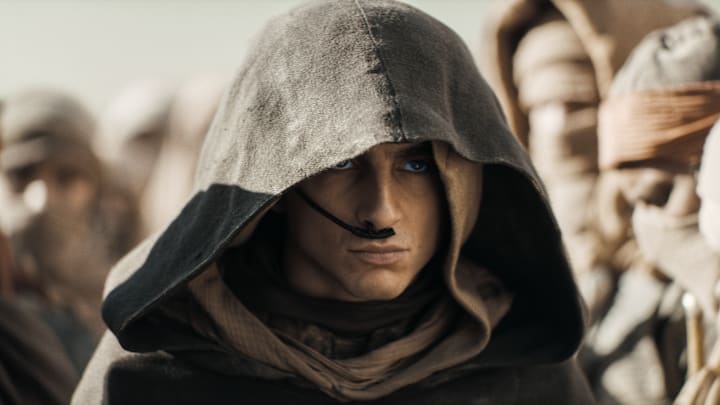The story of Dune is a hero's journey. It's about Paul Atreides, the young scion of a noble house who is violently deposed by the vile Harkonnen family. He hides for a time among the Fremen, the native people of the desert planet of Arrakis, before eventually becoming their leader and taking revenge on the Harkonnens, even becoming the emperor of the entire galaxy. Triumph!
The story of Dune is also a tragedy on a grand scale. The Fremen believe that Paul is a messiah, which is by design; the Bene Gesserit sisterhood planted prophecies among the Fremen generations ago specifically so they could have a way to control them. The Fremen come to follow Paul so fervently that, after he ascends the throne, they go out into the wider galaxy and wage a holy war in his name, killing scores of people who do not accept Paul as a divine being.
That's what happens at the very end of Dune: Part Two, which is now in theaters. Paul has defeated the emperor's soldiers and is threatening to destroy the spice, a powerful substance that grants long life to the nobility and enables space travel. It only exists on Arrakis. He makes this threat in order to intimidate the other great houses — then arrayed around the planet in their spaceships — into accepting his rule. But at the end of the movie, we hear that they refuse. "Take them to paradise," Paul says. The Fremen interpret this as a call to arms. They will go out and subdue any who resist Paul. The holy war has begun.
In Frank Herbert's Dune books, we eventually learn that the Fremen kill 61 billion people as part of their holy war, which is called a "jihad" in the books. Part of the tragedy of Dune is that Paul foresees this outcome using his prescient abilities, but is powerless to stop it.
And yet, the movies muddy the waters a bit by giving us more of a clear reason why the holy war begins. Remember when I said that the great houses refuse to accept Paul's rule? Well, in Frank Herbert's original 1965 Dune book, that doesn't happen, or if it does, it's not clear. In the books, we never really get a crystal clear reason what exactly started the holy war. We pick the story up in 1969's Dune Messiah years after it's already over, with billions dead.
That's part of why the holy war is so terrifying. It doesn't have a reason to happen, or at least, not a reason that Paul has any influence over. The implication is that the Fremen take it upon themselves to murder billions of people in honor of Paul their god-king made flesh, and that even if he protested, they wouldn't stop. In the movie, Paul seems to set the holy war in motion himself in a very direct way. And while he issues that command in religious language ("Take them to paradise"), he's doing it for political reasons: to force the great houses to accept his rule. There's less of a sense that things are out of his control, which is an important point from Herbert's books.
A lot of these points are made in a great back-and-forth thread started by IntendingNothingness on the Dune subreddit. The question for me is: does this change hurt or help the movie? I know that when I first read the Dune books, the vagueness surrounding why exactly the holy war began felt like an empty space that needed filling. It's crucial to Paul's story but we know relatively few details about it, which feels like an oversight. Then again, there's power in emptiness, in lack, and I'm not sure I liked movie-Paul filling in this blank for me, either.
i guess I would have liked a couple of tweaks so we still saw the holy war begin, and saw that it was out of Paul's control. But this is me nit-picking a very good movie. And I fully expect director Denis Villeneuve to dive into some of these knotty questions in the eventual sequel:
To stay up to date on everything fantasy, science fiction, and WiC, follow our all-encompassing Facebook page and sign up for our exclusive newsletter.
Get HBO, Starz, Showtime and MORE for FREE with a no-risk, 7-day free trial of Amazon Channels
